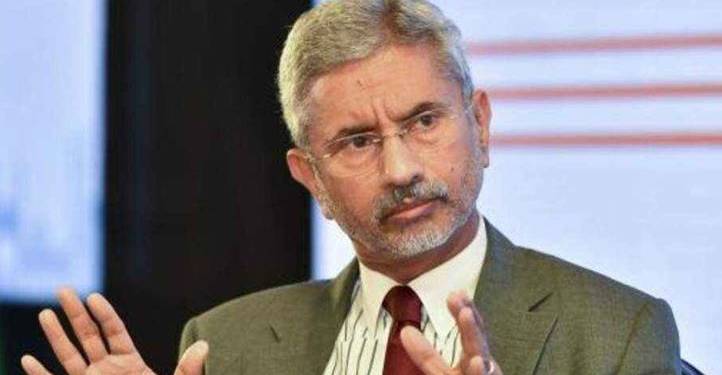
S Jaishankar gives a no-holds-barred warning to Taliban before the Intra-Afghan peace deal
by Akshay NarangAs the war-torn country of Afghanistan moves into real negotiations between the civilian Ashraf Ghani government and the Taliban, India has made it clear that it has skin in the game. And, as such, India’s External Affairs Minister Dr S. Jaishankar has issued a no-holds-barred warning to Taliban, making it clear that Afghan soil should not be used for anti-India activities, the minorities should not be tormented and women should not be reduced into second-class citizens.
Jaishankar himself addressed the “intra-Afghan” talks that began in Doha, Qatar on Saturday. The External Affairs Minister tweeted, “Addressed the conference on Afghan peace negotiations at Doha today. Conveyed that the peace process must be Afghan-led, Afghan-owned and Afghan-controlled, respect national sovereignty and territorial integrity of Afghanistan, promote human rights and democracy, ensure the interest of minorities, women and the vulnerable, effectively address violence across the country.”
Dr S. Jaishankar is a career diplomat, and he does use semantics very carefully. Therefore, when he says the Afghan peace process ‘must’ achieve what India has conveyed, then it implies that the Afghan peace process will have to move in this direction. New Delhi is not making mere suggestions, but bluntly telling the Taliban that it cannot go about attacking minorities, tormenting women and imposing Shariah law upon the war-scarred country.
This is probably the first time that India is strongly asserting its role in rebuilding Afghanistan which has been facing the scourge of war for the past several decades. New Delhi is also making it clear that it does notice how the Taliban has been targeting Indian interests in Afghanistan because India is supports the elected Ashraf Ghani government.
India does understand how the Taliban’s antagonism to minorities, particularly the Afghan Sikhs, is an attempt to undermine Indian interests in the war-ravaged country. Only in March this year, Taliban factions attacked a Gurudwara (Sikh temple) in Kabul because it wanted to target Indian diplomats visiting the Sikh place of worship.
India knows that the Haqqani group, a leading Taliban faction has frequently targeted Indian assets in Afghanistan, including attacks on the Indian Embassy. But Dr S Jaishankar’s warning against using the Afghan soil for anti-India activities makes it clear that New Delhi will not tolerate the Haqqani-ISI coalition in Afghanistan if it continues to target Indian interests and assets.
And therefore, when India’s External Affairs Minister conveys that the Afghan peace process must “effectively address violence across the country,” he makes it clear that India will poke Taliban from here on. And attacks on Indian assets cannot continue unabated, even as Afghanistan shapes for a post-US withdrawal political system.
Dr Jaishankar is also leveraging India’s present and future role in putting Afghanistan on the path of development. Therefore, he told the Conference on Afghan peace negotiations that “no part of Afghanistan is untouched by our 400-plus development projects,” while asserting confidence that this “civilizational relationship will continue to grow.”
India is making it clear that while the entire world marauded Afghanistan, it was New Delhi that reconstructed the Afghan Parliament, built roads, power transmission lines, schools, libraries and even a cricket stadium, apart from training the Afghan military, doling out scholarships to Afghan students and making the war-torn country self-sufficient. In fact, with $3 billion in aid since 2001, India remains the largest South Asian donor to Afghanistan.
Now, India is promising that this relationship will continue to grow. New Delhi can pull Afghanistan of the never-ending misery that it finds itself in.
In fact, New Delhi has also made the landlocked country of Afghanistan a partner in the Chabahar port project which will make Kabul more amenable to international trade. But at the same time, it is making it clear to the power-corridors in Kabul, particularly the Taliban that Indian goodwill and contribution in reconstructing Afghanistan isn’t supposed to be taken for granted.
To put India’s position on record amidst the intra-Afghan peace talks is a timely move on New Delhi’s part, as Afghanistan remains strategically important for India. The Indo-Pak rivalry impedes India’s Central Asian ambitions and therefore, New Delhi’s route to Central Asia has to go through Iran and Afghanistan. Central Asian countries like Tajikistan are emerging as a venue of future Sino-India competition amidst the heightened military tensions in Eastern Ladakh. As such, India needs to expand its footprint into this part of the world before it’s too late.
Moreover, the level of India’s selfless devotion to the cause of post-war reconstruction in Afghanistan and Indian interests in the landlocked country make New Delhi a natural stakeholder in Kabul’s progress towards a post-US withdrawal political reality. India has therefore taken the opportunity to put the Taliban in its place ahead of ground-breaking changes in Kabul.